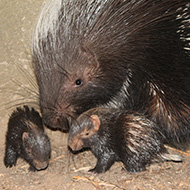
Porcupettes Hector and Hinata are bonding with their new family.
ZSL London Zoo has announced the arrival of two baby Cape porcupines – known as porcupettes.
Born in January to parents Hettie and Henning, the pair are said to be confidently exploring their new surroundings.
Cape porcupines are classed as a species of 'least concern' on the IUCN Red List, but they increasingly face the threats of habitat destruction and hunting.
Following the birth, zookeepers named the male and female duo Hector and Hinata, keeping with the trend to name all porcupines in the family with a letter starting with H. They join siblings nine-month-old Hershey and five-month-old Henry.
Keeper Veronica Heldt, who first discovered the duo on the Zoo's porcupine-cam, said they “are developing really well” and “bonding well with their new family”.
The twins weigh a healthy 660g and 750g and have spent their first week snuggling up to mum in their cosy indoor den.
Veronica said: “Thankfully for mum Hettie, baby porcupines are born with short, soft quills that harden at about one week of age, so labour wasn’t as painful as people might imagine!”
Native to central and southern Africa, Cape porcupines are considered 'ecosystem engineers' thanks to their expertise in foraging and digging. They are the largest
porcupine species and Africa’s second-largest rodent.
Image (C) ZSL London Zoo.



 The RCVS has announced a new version of its 1CPD mobile app, with enhanced features for veterinary surgeons and veterinary nurses to record their continuing professional development.
The RCVS has announced a new version of its 1CPD mobile app, with enhanced features for veterinary surgeons and veterinary nurses to record their continuing professional development.